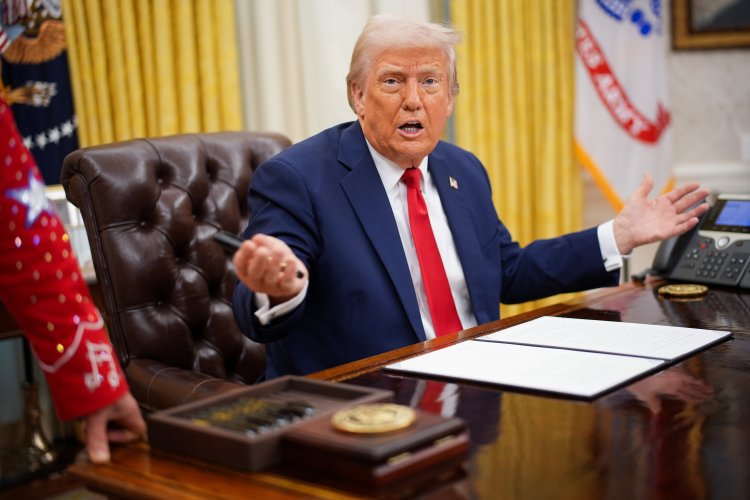'Trump Supporters Grapple with Trade Uncertainty: "In the long run, we’re all dead"'
A shared concern among both the president's allies and critics is the fear that the new levies will lead exhausted consumers into a renewed era of economic uncertainty.

However, Wall Street traders, lawmakers, industry leaders, foreign officials, and even some members of the president's team share a sense of dread about the potential consequences.
On Wednesday afternoon, during a "Make America Wealthy Again" ceremony, Trump will formally introduce a series of new so-called reciprocal tariffs on the U.S.'s global trading partners. He claims these measures will restore fairness, reduce the country’s reliance on foreign goods, and stimulate economic growth.
Yet, both allies and critics of the president express concern that these new tariffs might thrust weary consumers into a new era of economic uncertainty and possibly lead to a recession. Some Republicans, anxious about the possibility of losing their slim congressional majority in the midterms, are particularly worried that these levies could harm the president’s and the party’s standing regarding inflation, a critical issue for voters wary of the administration's trade strategies.
“Part of that is Trump’s negotiating style, to keep people he’s negotiating with, other countries, off balance. But he himself has said there’s going to be short term disruption, so of course people are concerned about that,” stated Sen. John Hoeven.
“We’ll have to see if it works,” he added.
Top officials in the White House have faced increasing uncertainty in recent days regarding the rollout of the policy, with details still being finalized as of Tuesday. Some aides are preemptively looking to attribute blame to Commerce Secretary Howard Lutnick, perceiving him as an enabler of Trump’s more extreme tariff impulses and fearing he has not conveyed the full economic risks of the plan.
This policy rollout arrives amidst heightened political anxiety for Republicans, especially with two congressional special elections in Florida and a Wisconsin Supreme Court race Tuesday that are seen as key tests for the party. Democratic victories or strong performances in districts typically viewed as GOP strongholds could further alarm lawmakers concerned about the perception that Trump has failed to fulfill his primary promise to control inflation and bolster economic conditions for middle-class Americans.
Trump has acknowledged the potential short-term pain for consumers but insists that the long-term advantages will outweigh it. Economists across the spectrum have expressed skepticism about this wager, cautioning that the tariffs could raise consumer prices and potentially lead the U.S. into a recession without delivering the benefits Trump has predicted.
Economists at Goldman Sachs raised the probability of a U.S. downturn in the next year from 20 to 35 percent on Sunday, citing declining consumer and business confidence as well as “statements from White House officials indicating greater willingness to tolerate near-term economic weakness in pursuit of their policies.”
Other economic forecasts have similarly adjusted their predictions, leaning toward stagnation and rising prices—often referred to as “stagflation”—or an outright recession.
In the latest benchmark survey from the Institute for Supply Management released Tuesday, the manufacturing sector is reported to be contracting again, following two months of growth after over two years of decline.
“Orders continue to slow, as discussions about who will pay for potential tariff costs are the prime topic of negotiations between buyers and sellers,” remarked Tim Fiore, who chairs the ISM’s manufacturing survey committee.
White House press secretary Karoline Leavitt encouraged the American public to trust the president and his trade team, insisting, “They're not going to be wrong. It is going to work.”
However, the president faces significant political risk, especially as Americans observe declines in their 401(k) accounts corresponding with stock market fluctuations. An AP-NORC poll conducted from March 20 to 24 indicates that only 4 in 10 voters view Trump's handling of the economy and trade positively, a stark contrast to the roughly half who support his immigration policies. In fact, approximately 3 in 10 Republicans disapprove of how he is managing trade.
The timing is critical; the American public currently feels more uneasy about their economic situation than they did when many voted for him last fall, largely over economic concerns. The University of Michigan’s Consumer Sentiment Index was 57 percent in March, down 11.9 percent from February and 28.2 percent from a year prior, when economic enthusiasm was already tepid.
It remains uncertain how much political suffering Trump, who often interprets market performance as an indicator of his presidency, will tolerate as he navigates his political legacy and strives to pass more of his agenda through narrowly divided congressional majorities. He has also begun hinting at a potential third term, a prospect that, while unconstitutional, could make him more politically cautious.
On Tuesday, the stock market fluctuated, with the S&P 500 down roughly 3 percent compared to a week earlier.
As he observes the market dipping beneath its levels from when he took office, Trump has turned increasingly to pledges of investment from major companies as evidence of his tariff plan's effectiveness. He claims that record levels of investment are occurring, though such pledges may exaggerate actual spending increases and job creation, with the full impact of these investments taking years to materialize.
The president's tariff strategies are also exacerbating divisions within the Republican Party, pitting a dwindling faction of free-trade conservatives against a more prominent protectionist element that has gained traction under the MAGA banner. For instance, the Heritage Foundation, a traditional proponent of free trade, surprised many when its president, Kevin Roberts, posted on X in support of Trump's tariff strategy on Sunday.
“President Trump is ending outdated trade policies that harm hard-working Americans,” Roberts commented. “So now globalist elites are spitting mad that we are finally putting the interests of American workers, families, and communities over the pocketbooks of self-anointed ‘citizens of the world.’”
This rift was apparent within the Capitol, where some Republicans maintain optimism that Trump’s tariffs are part of a larger strategy to ultimately lower global trade barriers—contradicting Trump's stated aim of using tariffs to bring businesses back to the U.S.
Sen. John Kennedy stressed to reporters that he advocates for eliminating all tariffs to ensure a level playing field, an idea echoed by the U.S. Chamber of Commerce but largely opposed by many of Trump’s closest advisers.
“I’m talking about zero tariffs,” Kennedy articulated. “Zero tariffs on American goods to Japan. Zero tariffs on Japanese goods to the United States of America. Let the companies compete. What’s wrong with that?”
Kennedy concurred with Trump’s rationale but expressed impatience about the timeline.
“In the long run, [it] will probably work,” he remarked regarding Trump’s imposition of substantial trade barriers. “The problem is that in the long run we’re all dead, and so the short run matters.”
Some members of the House Ways and Means Committee are expected to attend the event, according to a source who wished to remain anonymous. Their attendance appears aimed at demonstrating broad GOP backing for the tariffs but could additionally burden the party with accountability if the strategy fails.
Democrats in Congress are intensifying their efforts to pressure Republicans who are privately uneasy about the ramifications of the tariffs. Sen. Tim Kaine is spearheading an initiative to force a vote aimed at removing a portion of Trump's initial tariffs, specifically the 25 percent levy on Canadian goods.
Kaine and Sen. Amy Klobuchar have noted the anxiety among Republican lawmakers, who have not yet been willing to openly denounce the tariffs.
"Our Republican colleagues behind closed doors are telling us, ‘Keep going, keep going, keep doing this,” Klobuchar remarked. “Go do this because this is just decimating our businesses and our state.’”
Across the Atlantic, U.S. allies appear more resigned than hopeful.
“Preparedness on the EU side is the sentiment,” shared one anonymous European diplomat regarding the countries' response.
“The EU regrets the actions the U.S. will take tomorrow,” the diplomat added, “but it has been preparing, and is ready to respond."
Max Fischer for TROIB News
Find more stories on Business, Economy and Finance in TROIB business












